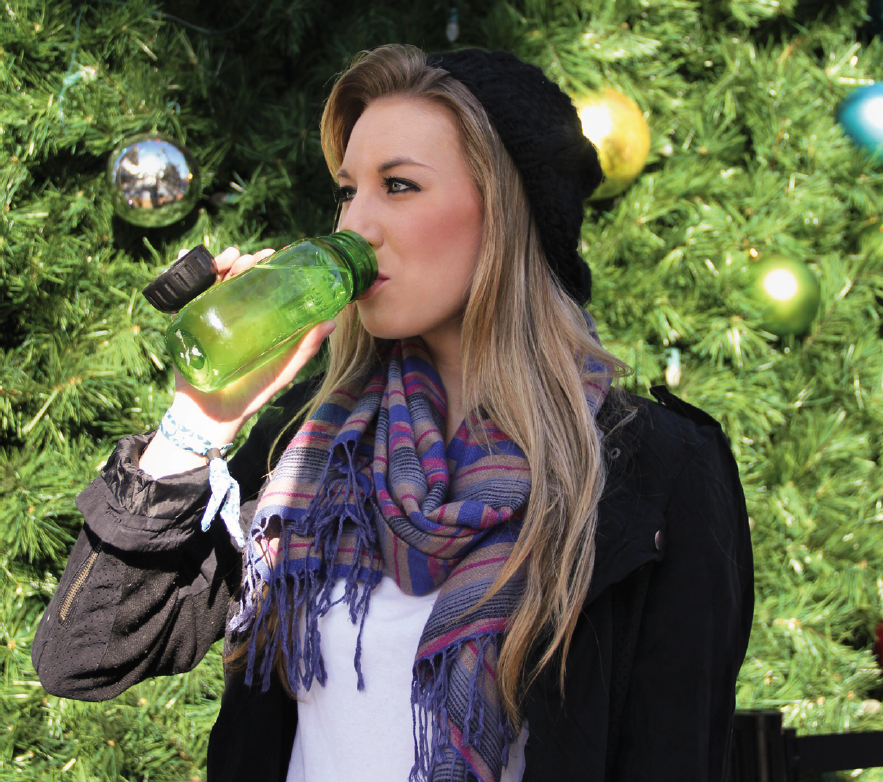BY DR. MICHAEL J. ROBB, DC, BA, AAS
 Drinking water during the summer months to stay hydrated is a given—however, it is equally important to consume the same eight 8-ounce glasses of water in the winter months. Every breath that we exhale further depletes our body’s water content. The steam you see when exhaling outside when it’s cold is fluid leaving your body. Winter air is drier and therefore causes a depletion of our bodies’ fluid levels. Though it may seem like a summertime phenomenon, dehydration can strike during any season and is, in fact, accelerated during cold weather and at higher altitudes because the air is drier under these conditions. When we breathe, our bodies humidify the dry outside air and heat it up to our body’s temperature – which is why our wintery exhalations look like fog when it’s cold out. If we are spending time outdoors during the cold months, we can lose between one to two liters of water a day through evaporation from the lungs – making it even more important to drink water.
Drinking water during the summer months to stay hydrated is a given—however, it is equally important to consume the same eight 8-ounce glasses of water in the winter months. Every breath that we exhale further depletes our body’s water content. The steam you see when exhaling outside when it’s cold is fluid leaving your body. Winter air is drier and therefore causes a depletion of our bodies’ fluid levels. Though it may seem like a summertime phenomenon, dehydration can strike during any season and is, in fact, accelerated during cold weather and at higher altitudes because the air is drier under these conditions. When we breathe, our bodies humidify the dry outside air and heat it up to our body’s temperature – which is why our wintery exhalations look like fog when it’s cold out. If we are spending time outdoors during the cold months, we can lose between one to two liters of water a day through evaporation from the lungs – making it even more important to drink water.
Your body has three mechanisms for cooling:
Conduction The body loses a small amount of heat when the skin contacts a surface with a lower temperature (e.g., when lying on the cool grass).
Radiation
The body loses heat due to infrared rays, similar to the sun heating the earth (heat transfer without touching). The skin’s temperature must be higher than the environment for this method to work.
Convection And/Or Evaporation The body loses heat when in contact with water or air molecules. When the environmental temperature rises, the primary mechanism for cooling the body is through sweating and evaporation.
Physical activities in cold weather coupled with wearing heavier clothes can cause us to sweat. The lack of desire to quench our thirst with cold water is more pronounced during colder weather. When our bodies are cold, we usually seek warm beverages such as tea, coffee or spirits to do the job. Unfortunately, this becomes another avenue for fluid loss as these beverages naturally dehydrate the body.
| General signs of dehydration can include headaches, vision problems, poor physical performance, lack of energy, and short-term memory loss. During the winter months, symptoms of dehydration include dark-colored urine, dry skin and nails, chapped lips, and bleeding through the nose – it only takes a 2%-5% fluid drop to see the signs. An electrolyte imbalance can also prevent our bodies from retaining the fluids that we drink.The cure? There are a lot of things you can do to stay hydrated during the winter months. One of the increasingly popular drinks is coconut water, which has fifteen times more potassium than Gatorade, and without the high fructose corn syrup. You can also try adding fresh squeezed lemon juice to your water, adding flavor. Adding a small amount of natural sea salt to your food is another way to help the body retain fluids, and warm soups can be great for hydrating the body during cold weather. Also, incorporating garlic into your diet will raise your thirst mechanism, increasing your desire to drink water.So whether you are hiking, skiing, or warming up in a hot tub, remember to be aware of your fluid intake. I advise my patients on the three H’s…stay Happy, Healthy and Hydrated, and longevity will be on your side! |
WATER FACTS
|
Dr. Michael J. Robb, DC, BA, AAS, is a chiropractic physician with more than 10 years of experience practicing in the metro-Phoenix area. Dr. Robb applies his experience in engineering with bio-mechanics to help improve both the body and mind. For more information about Dr. Robb and his two Valley practices—FIX24 and ChiroCare Wellness—visit thefix24.com.
Photo by Diana Lustig







May I have Diana Lustig’s permission to use her photo of the woman drinking water for my organization’s Winter Newsletter? We are writing an article on the importance of Hydration, much like your article. We would like to request the use of your photo and under what responsibilities to site? This is for a non-profit organization. Please contact me at jshotts@MilestonePA.org is this is something that you would permit.